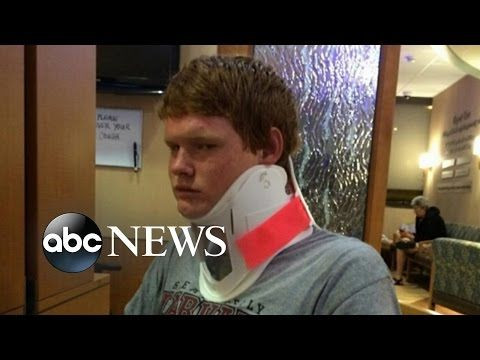San Diego-Area High School Football Player Trey Enloe Sues District Over Life-Altering Concussions Sustained In Game

A high school football team’s win-at-all-costs attitude caused lasting damage to one of its players, alleges a new lawsuit filed against the San Diego Unified School District.
As reported by CBS 8, the family of Trey Enloe, 17, a La Jolle High School junior varsity football player, is suing the district after Enloe sustained multiple concussions during a October 2014 game against Point Loma. Enloe, the family claims, suffered a head injury during the game, telling his coaches that he didn’t feel well, only to be ignored.
"He was told to get back in there [by the assistant coach]. To 'suck it up,' and get back in the field," the Enloes’ attorney William M. Berman told CBS 8. Sure enough, Enloe ended up taking more knocks to the head before finally being taken out for good.
Afterward, it was discovered that Enloe did indeed suffer multiple and severe concussions — injuries that his mother, Jana Enloe, worries have continued to affect his physical and mental wellbeing. "I just have to ask you, have you ever thought about taking your own life? And he said yes, Mom, I have. That is the part I just, as a mom, I don't want my child to ever have that feeling," she said. The family says that Enloe will undergo additional testing this upcoming February.
Though the school district has refused comment due to the ongoing litigation, they have stated that in the wake of Enloe’s concussions, it has changed its policies surrounding concussion, including requiring all coaches to take a training course by the California Interscholastic Federation. After being suspended by the school for two games, assistant coach Steven Wachs hasn’t returned to the team, according to Berman. "When you start letting coaches inflict their personal desires to win at all costs that is when we have problems," he said.
While concussions, or traumatic brain injuries, especially among athletes, are known to possibly have lasting effects on cognition, mental health, and even sleep, that possibility becomes much more likely for people who receive multiple concussions within a short period of time. “It appears that youth athletes who sustain multiple concussions experience a variety of subtle effects, which may be possible precursors of the future onset of concussion-related difficulties,” concluded a 2011 study comparing students like Trey Enloe to those who had never suffered a concussion.
In very rare cases, the second head injury, even a relatively minor one, can set off an accelerated and usually fatal swelling of the brain — a condition known as second impact syndrome.



























